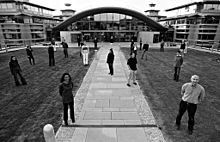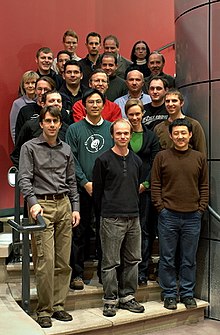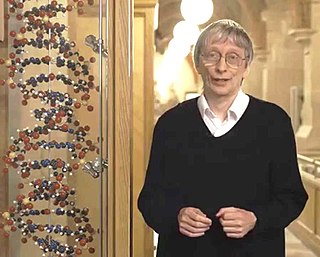
David Elieser Deutsch is a British physicist at the University of Oxford. He is a visiting professor in the Department of Atomic and Laser Physics at the Centre for Quantum Computation (CQC) in the Clarendon Laboratory of the University of Oxford. He pioneered the field of quantum computation by formulating a description for a quantum Turing machine, as well as specifying an algorithm designed to run on a quantum computer. He has also proposed the use of entangled states and Bell's theorem for quantum key distribution and is a proponent of the many-worlds interpretation of quantum mechanics.

Quantum information is the information of the state of a quantum system. It is the basic entity of study in quantum information theory, and can be manipulated using quantum information processing techniques. Quantum information refers to both the technical definition in terms of Von Neumann entropy and the general computational term.
This is a timeline of quantum computing.
The Deutsch–Jozsa algorithm is a deterministic quantum algorithm proposed by David Deutsch and Richard Jozsa in 1992 with improvements by Richard Cleve, Artur Ekert, Chiara Macchiavello, and Michele Mosca in 1998. Although of little practical use, it is one of the first examples of a quantum algorithm that is exponentially faster than any possible deterministic classical algorithm.
Quantum information science is a field that combines the principles of quantum mechanics with information science to study the processing, analysis, and transmission of information. It covers both theoretical and experimental aspects of quantum physics, including the limits of what can be achieved with quantum information. The term quantum information theory is sometimes used, but it does not include experimental research and can be confused with a subfield of quantum information science that deals with the processing of quantum information.

Artur Konrad Ekert is a British-Polish professor of quantum physics at the Mathematical Institute, University of Oxford, professorial fellow in quantum physics and cryptography at Merton College, Oxford, Lee Kong Chian Centennial Professor at the National University of Singapore and the founding director of the Centre for Quantum Technologies (CQT). His research interests extend over most aspects of information processing in quantum-mechanical systems, with a focus on quantum communication and quantum computation. He is best known as one of the pioneers of quantum cryptography.

The Department of Computer Science is the computer science department of the University of Oxford, England, which is part of the university's Mathematical, Physical and Life Sciences Division. It was founded in 1957 as the Computing Laboratory. By 2014 the staff count was 52 members of academic staff and over 80 research staff. The 2019, 2020 and 2021 Times World University Subject Rankings places Oxford University 1st in the world for Computer Science. Oxford University is also the top university for computer science in the UK and Europe according to Business Insider. The 2020 QS University Subject Rankings places The University of Oxford 5th in the world for Computer Science.
Richard Jozsa is an Australian mathematician who holds the Leigh Trapnell Chair in Quantum Physics at the University of Cambridge. He is a fellow of King's College, Cambridge, where his research investigates quantum information science. A pioneer of his field, he is the co-author of the Deutsch–Jozsa algorithm and one of the co-inventors of quantum teleportation.

The Mathematical Institute is the mathematics department at the University of Oxford in England. It is one of the nine departments of the university's Mathematical, Physical and Life Sciences Division. The institute includes both pure and applied mathematics and is one of the largest mathematics departments in the United Kingdom with about 200 academic staff. It was ranked as the top mathematics department in the UK in the 2021 Research Excellence Framework. Research at the Mathematical Institute covers all branches of mathematical sciences ranging from, for example, algebra, number theory, and geometry to the application of mathematics to a wide range of fields including industry, finance, networks, and the brain. It has more than 850 undergraduates and 550 doctoral or masters students. The institute inhabits a purpose-built building between Somerville College and Green Templeton College on Woodstock Road, next to the Faculty of Philosophy.

Professor Anthony John Grenville Hey was vice-president of Microsoft Research Connections, a division of Microsoft Research, until his departure in 2014.
The Centre for Quantum Technologies (CQT) in Singapore is a Research Centre of Excellence hosted by the National University of Singapore. The Centre brings together physicists, computer scientists and engineers to do basic research on quantum physics and to build devices based on quantum phenomena. Experts in quantum technologies are applying their discoveries in computing, communications and sensing.
Patrick Hayden is a physicist and computer scientist active in the fields of quantum information theory and quantum computing. He is currently a professor in the Stanford University physics department and a distinguished research chair at the Perimeter Institute for Theoretical Physics. Prior to that he held a Canada Research Chair in the physics of information at McGill University. He received a B.Sc. (1998) from McGill University and won a Rhodes Scholarship to study for a D.Phil. (2001) at the University of Oxford under the supervision of Artur Ekert. In 2007 he was awarded the Sloan Research Fellowship in Computer Science. He was a Canadian Mathematical Society Public Lecturer in 2008 and received a Simons Investigator Award in 2014.
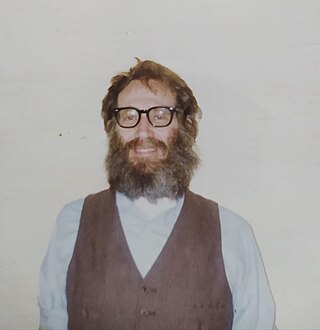
Stephen J. Wiesner was an American-Israeli research physicist, inventor and construction laborer. As a graduate student at Columbia University in New York in the late 1960s and early 1970s, he discovered several of the most important ideas in quantum information theory, including quantum money, quantum multiplexing and superdense coding. Although this work remained unpublished for over a decade, it circulated widely enough in manuscript form to stimulate the emergence of quantum information science in the 1980s and 1990s.
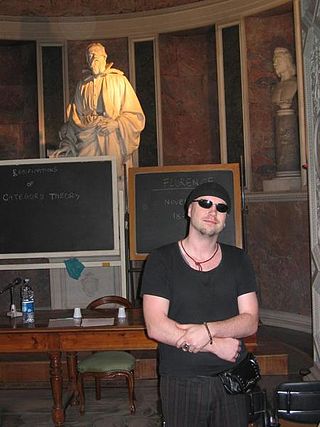
Bob Coecke is a Belgian theoretical physicist and logician who was professor of Quantum foundations, Logics and Structures at Oxford University until 2020, when he became Chief Scientist of Cambridge Quantum Computing, and after the merger with Honeywell Quantum Systems, Chief Scientist of Quantinuum. In January 2023 he also became Distinguished Visiting Research Chair at the Perimeter Institute for Theoretical Physics. He pioneered categorical quantum mechanics, Quantum Picturalism, ZX-calculus, DisCoCat model for natural language, and quantum natural language processing (QNLP). He is a founder of the Quantum Physics and Logic community and conference series, and of the applied category theory community, conference series, and diamond-open-access journal Compositionality.
Philip Candelas, is a British physicist and mathematician. After 20 years at the University of Texas at Austin, he served as Rouse Ball Professor of Mathematics at the University of Oxford until 2020 and is a Fellow of Wadham College, Oxford.
Constructor theory is a proposal for a new mode of explanation in fundamental physics in the language of ergodic theory, developed by physicists David Deutsch and Chiara Marletto, at the University of Oxford, since 2012. Constructor theory expresses physical laws exclusively in terms of which physical transformations, or tasks, are possible versus which are impossible, and why. By allowing such counterfactual statements into fundamental physics, it allows new physical laws to be expressed, such as the constructor theory of information.

Paul Anthony Benioff was an American physicist who helped pioneer the field of quantum computing. Benioff was best known for his research in quantum information theory during the 1970s and 80s that demonstrated the theoretical possibility of quantum computers by describing the first quantum mechanical model of a computer. In this work, Benioff showed that a computer could operate under the laws of quantum mechanics by describing a Schrödinger equation description of Turing machines. Benioff's body of work in quantum information theory encompassed quantum computers, quantum robots, and the relationship between foundations in logic, math, and physics.
Nilanjana Datta is an Indian-born British mathematician. She is a Professor in Quantum Information Theory in the Department of Applied Mathematics and Theoretical Physics at the University of Cambridge, and a Fellow of Pembroke College.
Elham Kashefi is a Professor of Computer Science and Personal Chair in quantum computing at the School of Informatics at the University of Edinburgh, and a Centre national de la recherche scientifique (CNRS) researcher at the Sorbonne University. Her work has included contributions to quantum cryptography, verification of quantum computing, and cloud quantum computing.
Chiara Marletto is a theoretical physicist at Wolfson College, Oxford. She is a pioneer in the field of constructor theory, a generalization of the quantum theory of information.
